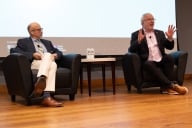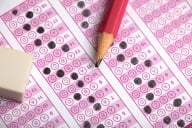You have /5 articles left.
Sign up for a free account or log in.
After two decades in the classroom, I only teach texts that resist the arguments I make about them -- texts that refuse to submit to any one person’s singular theory, however astute. That was not always the case.
In my 20s and 30s, my classrooms were courtrooms, and I was a trial lawyer. I built an argument. Text upon text, lecture upon lecture, I used the material to my own ends. In my class on charity, I deployed secondary sources to plot a too-neat historical story from alms in the ancient world to modern philanthropy. In my class on aging, I marshaled articles to confirm my thesis that old age in the 20th century became a disease doctors sought to cure.
I set the terms, I set the reading and I set the narrative. Two years ago, I buried this approach. It was a private funeral -- no announcement, no guests, no eulogy.
Pollsters have had a more public entombment. Their work has been exposed as an art rather than a science, and the public’s faith in their precision has been shaken. At the most basic level, pollsters are experts in treating human beings as arguments. They build models and subsume individuals, whom they call data, into evidence.
But in 2020, evidence resisted models. Whatever we wanted to believe about the recent election, we have one reason to be thankful. Our humanity has once again proven to be more complex and more mysterious than any singular description of our behavior can capture.
When I stopped teaching arguments, I started teaching texts -- those that fight back against intellectual instrumentalism. I learned the power of a resistant text when I first taught Herman Melville’s classic short story about a lawyer hiring an obdurate scribe, “Bartleby the Scrivener,” in a course on American civic life. I wanted to use Bartleby (hear the hubris) as a case study in how human beings can never avoid the significant ethical quandaries of their time. I wanted to explain how the lawyer, “an eminently safe man,” was “awed” into “tame compliance” by a “cadaverous” scrivener who speaks five words: “I would prefer not to.” Bartleby, in this reading, creates an emotional palette for the experience of ethical impotency. When placed in the context of the 1850s, I would claim through historical documents, that story was a scathing rebuke of a “snug” life in immoral times.
My students simply did not read Bartleby this way. They rejected my argument. Like sensitive readers over the past 150 years, they encountered their own Bartleby. They saw a young man stripped of will, depleted and depressed. The inner life of Bartleby was more important to them than the moral demands of the lawyer trying to cope with his “pallid” employee. They forced our class to encounter a certain kind of desperation, a certain description of sadness, that seemed to affect so many of their friends and family members.
That was hour one. By hour two, Bartleby had morphed yet again. My students argued that it was a story about work and the painful monotony of professional demands. The story resisted us all while also compelling us into a series of different encounters with its demands, bestowing upon us a relationship with the text. What was Bartleby really about? At the end of the class, we all agreed that we would need to return to the story, again and again, to come closer to grasping its enigmatic meaning. It resisted our interpretation, but it never left our lives.
Civic Education That Challenges Us
It has become increasingly urgent to confront the limits of singular theories. Productive doubt is not a skill often acquired in math or computer science class; it is not learned through engineering or statistics -- it is learned in that often-discarded realm of college life: the humanities.
This moment is an opportunity for humanists across the country to make the case for teaching significant books -- those once-modern forms of technology -- that speak to the complexity of human motivation. At their best, these works, which Melinda Zook at Purdue University calls transformative texts, offer us all a way to confront the mystery of the human condition, and in our very specific contemporary context, all that we don’t understand about American politics. In response to the stark failure of polling models or voting categories to fully describe our human impulses, educators can take up the ancient habit of investigating what is endlessly particular and still universal about the human soul through the craft of reading texts together. This craft can become an anchor not just of humanistic education but also of civic education.
What we need in our colleges and universities is a form of civic education that challenges our preconceptions and captures our imagination, encouraging curiosity rather than judgment. The questions one asks of resistant texts are the ones we must learn to ask as individuals, too -- questions that uncover the depth of human idiosyncrasy, and frailty. What are the different motivations that underlie our protagonist’s decision? How did she change in the story? How did the world change around him? What do they fear and how did it influence the social community they created? What is the relationship between individual freedom and social good?
Too often we use our rational faculties to prevent ourselves from confronting honestly the confusion all around and within us. We put people into categories, years into eras and discrete data points into themes and models. There is an elegance in this approach.
But when it fails -- when models are exposed as imperfect -- it is time to return again to works of literature that resist any neat summary or inference and outlast the proclivities of any single reader. It is time to return to the form of human knowledge that is invested in uncovering, through the craft of language and storytelling, an individual’s capacity to act in ways that are evocative, magnificent, repulsive and endlessly within and outside our grasp. This is a time to teach with humility and to reckon with how little we understand about ourselves, our textual tradition and even our fellow Americans.
Ah Bartleby! Ah humanity!







